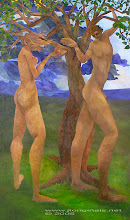I think he's losing his grip on Locke, consciousness and reality.
http://www.youtube.com/watch?v=Y693BveTT48
But he might be brilliant. If I can bring myself to watch again I'll probably know. Probably.
Friday, October 16, 2009
Lots of Locke 'n' homework!
I've done a little summarising of the Locke we've done this week, but I'm going to save the primary & secondary ideas stuff until you've done the homework!
John Locke ‘Primary & Secondary Qualities
- Explain Locke’s distinction between ‘primary’ and ‘secondary’ qualities.
- Why does Locke feel it is necessary to distinguish between primary & secondary qualities?
- Can you think of any problems or flaws in the idea of primary & secondary qualities?
- Why does this distinction make Locke a realist?
- Could he justify or ground his 'realism' - if so how? if not why not?
- What are the implications of Locke's view in terms of constructing an epistemological theory?
Have a good think about these things and say as much as you can.
Due Wednesday 21st October
Locke: where Ideas 'really' come from
This week, amongst other things and many interesting philosophical ramblings, we read from 'Book 2, Chapter 1' of Locke's 'An Essay Concerning Human Understanding' and saw how he believed our minds come to be filled with ideas. We saw that, for Locke, all ideas come from two sources:
1. experience of 'external objects' received through our senses
(SENSATION)
2. experience of the workings of our own minds.
(REFLECTION)
As he puts it:
Our understandings derive all the materials of thinking from [1] observations that we make of external objects that can be perceived through the senses, and [2] of the internal operations of our minds, which we perceive by looking in at ourselves.
For Locke, those are the only ways that we get ideas. He says, 'These two are the fountains of knowledge, from which arise all the ideas we have or can naturally have.'
('Essay' Bk ii Ch.1)
Locke goes on to distinguish between 'simple' and 'complex' ideas.
In Book 2, Ch 12, he says that the mind 'exerts its power' on simple ideas in 3 ways:
(1) Combining several simple ideas into one compound one; that is how all complex ideas are made.
(2) Bringing together two ideas, whether simple or complex, setting them side by side so as to see them both at once, without uniting them into one; this is how the mind gets all its ideas of relations.
(3) Separating them from all other ideas that accompany them in their real existence; this is called abstraction, and it is how all the mind’s general ideas are made.
He goes on to tell us that:
'Ideas thus made up of several simple ones I call complex. Examples are ·the ideas of· beauty, gratitude, a man, an army, the universe.'
So, to make complex ideas we take simple ideas and mix them, put them side by side, or try to see them in isolation from other simple ideas that they may be muddled and confused with.
Easy!
Sunday, October 11, 2009
Locke on Innate Ideas
We saw that Locke had several arguments against the notion of innate ideas and they went something like this:
1. NO UNIVERSAL CONSENT:
If any idea were innate in all human minds then surely certain ideas would be universally accepted and agreed on. But they're not.
2. CHILDREN & IDIOTS:
Locke says that,
to imprint anything on the mind without the mind’s perceiving it seems to me hardly intelligible. So if children and idiots have souls, minds, with those principles imprinted on them, they can’t help perceiving them and assenting to them.In other words it makes no sense to speak of an idea being in our minds without us being aware of it. How can we have 'understandings' that we don't understand. Surely the whole point of an idea is that it is 'had'. (As in, "I've just had an idea!" said Clive.)
3. THE CIRCULAR ARGUMENT:
Locke attacks saying this the argument that we only come to knowledge of these 'innate' ideas when we develop our 'reason', saying that it is non-sensical and seems circular' because in order to know innate ideas we have to have reason, but the evidence that we have 'reason' is our knowledge of innate ideas. Doh!
This attack on innate ideas was revolutionary in Locke's day and has profound implications: if a person is 'blank slate' then we can draw anything on it. This makes politics, education and the whole nature of a society fundamental to the kind of human beings it produces. This is the old nature/nurture debate which seems to rumble on forever without ever really getting anywhere, usually because the people debating it have political axes to grind and are not actually open to discussion.
Saturday, October 10, 2009
Descartes, Locke & the Story of Epistemology
I wanted to remind you of the point of the stuff we'd looked at - why did Descartes bother to sit in his oven searching for certainty? What was the story? So we wrote a little note that was similar to what follows except I've tried to improve and clarify it. And I've added a long rambling introduction.
Descartes was working in a difficult period, (aren't we all?), he was very keen on the new scientific thinking or 'natural philosophy' as it was called, which had begun to question the dominant religious ideology of the time. It was only 100 years since Copernicus had rather upset the church by demonstrating the 'revolutionary' idea that the Earth revolved around the sun, thus shifting 'man' from the centre of the universe where God had apparently put him.
Descartes himself was big on maths inventing Cartesian coordinates by which you can identify the precise spot at which a fly is located on a ceiling! Anyway, he wanted to apply the new 'scientific' way of thinking to the most fundamental questions like 'is Scott right about the Matrix?' He wanted to turn the rigour of rational thought inward and examine the contents of his mind. But we could also read his Meditations as a program for rebuilding society: Descartes wanted to sweep away superstition and received wisdom and replace it with rationally constructed principles. He also wanted to show that he could prove a) the power of 'men' to use rational thought and b) that God existed. If he could use the power of rational thought to prove that God existed then he hoped the church might see the rational enquiring mind as less threatening and more helpful.
So, if Descartes was to challenge all the strange ideas of his time he had to have a strong foundation for his own knowledge claims. that foundation is of course provided by his 'cogito', and on this point of certainty that he 'grounds' his epistemology. The cogito is thus 'foundational'.
Having established beyond any scepticism the certainty of his existence as a thinking thing, Descartes can claim epistemological grounds for his subsequent ideas about the nature of the physical world that he perceives through his senses, (like the wax) but knows and understands through his faculty of Reason.
John Locke, some 50 years later, rejects Descartesʼ ideas as to how to ground knowledge. For Locke the mind is a blank slate - a tabula rasa, and all the ideas, all the knowledge that we come to possess comes to us through our senses.
This dispute sets up a philosophical debate that has, in various forms, rumbled on into contemporary philosophy.
The argument can be summed up in basic terms as a dispute about how the kinds of things that seem to go on inside our heads relate to the kinds of things that seem to go on outside our heads. Do we have accurate representational knowledge of the world? Is that even a sensible question?
Friday, October 9, 2009
Three Minute Philosophy
Found a "Three Minute Philosophy on John Locke" on YouTube. Thought I'd post it on here...
http://www.youtube.com/watch?v=X-buzVjYQvY
http://www.youtube.com/watch?v=X-buzVjYQvY
Saturday, October 3, 2009
Fisticuffs in Filosophy!
We examined the distinctions between logical and empirical truths and had a very stimulating debate! Joe and Jake were very reluctant to accept the idea that there was a clear distinction between the statements 'All humans are mortal' & 'Children are younger than their parents' or 'Accepting the notion of linear time, children are younger than their biological parents.' - as it ended up. Even if we accept strange experiments with genetic material no-one can ever be older than the genetic material from which they come.
The point is that it would be possible to adjust the concept of 'human' to include the notion of immortality if we ever have empirical knowledge of such a thing, (and I accept the whole notion of infinity raises all sorts of problems), but it's logically possible, whereas it is logically impossible to adjust the meaning of the word 'child' so that it doesn't mean 'of a parent'.
In the opinion of the referee (me) Scott, Sam & Will (Georgina was lucky enough to miss the atmosphere of violence and intimidation) won at least 2 -1. :)
The point is that it would be possible to adjust the concept of 'human' to include the notion of immortality if we ever have empirical knowledge of such a thing, (and I accept the whole notion of infinity raises all sorts of problems), but it's logically possible, whereas it is logically impossible to adjust the meaning of the word 'child' so that it doesn't mean 'of a parent'.
In the opinion of the referee (me) Scott, Sam & Will (Georgina was lucky enough to miss the atmosphere of violence and intimidation) won at least 2 -1. :)
A Priori Knowledge
We finished off Descartes (the first 3 Meditations anyway, which is enough for our purposes at the moment) and then got to grips with some of the important concepts they involve.
 The term 'a priori' which translates as something like 'before experience' doesn't really mean 'before' experience which makes it confusing. What it means is 'independent of' or 'outside of' experience, but the easiest way to think of it is as knowledge that you don't need to go and check by having a look at the world - you don't need 'empirical evidence' - you don't need to use your senses. So, you can know that the internal angles of a triangle add up 180º without having to go out and feel, sniff, see, hear or eat any triangles.
The term 'a priori' which translates as something like 'before experience' doesn't really mean 'before' experience which makes it confusing. What it means is 'independent of' or 'outside of' experience, but the easiest way to think of it is as knowledge that you don't need to go and check by having a look at the world - you don't need 'empirical evidence' - you don't need to use your senses. So, you can know that the internal angles of a triangle add up 180º without having to go out and feel, sniff, see, hear or eat any triangles. Think about a perfect circle. Because that's all you can do: think about it, that is, because a perfect circle does not exist anywhere in the real world (honest, Joe!) So you can only know a 'perfect' circle in an 'a priori' way. A problem with this kind of knowing is that it doesn't seem very different to 'imagining'. I can imagine a perfect circle then set out to try and build one and I might end up with something very useful for wheels and things. I can imagine a perfect society where everyone values learning, art and fairness, and I can set out to build one. So what's the difference? Mmm ... I'll stop there.
Although you should be aware, that the term a priori is not uncontentious (some philosophers suggest the term has no real meaning or content: see Michael Devitt's 'No Place for the a Priori' at http://web.gc.cuny.edu/Philosophy/people/devitt/papers.html
Unfortunately our exam board still seem to take the notion as a given (see Paper One, Q. 1, May 2009). I hope to point out their ignorance at a forthcoming meeting.
Although you should be aware, that the term a priori is not uncontentious (some philosophers suggest the term has no real meaning or content: see Michael Devitt's 'No Place for the a Priori' at http://web.gc.cuny.edu/Philosophy/people/devitt/papers.html
Unfortunately our exam board still seem to take the notion as a given (see Paper One, Q. 1, May 2009). I hope to point out their ignorance at a forthcoming meeting.
Subscribe to:
Comments (Atom)
























